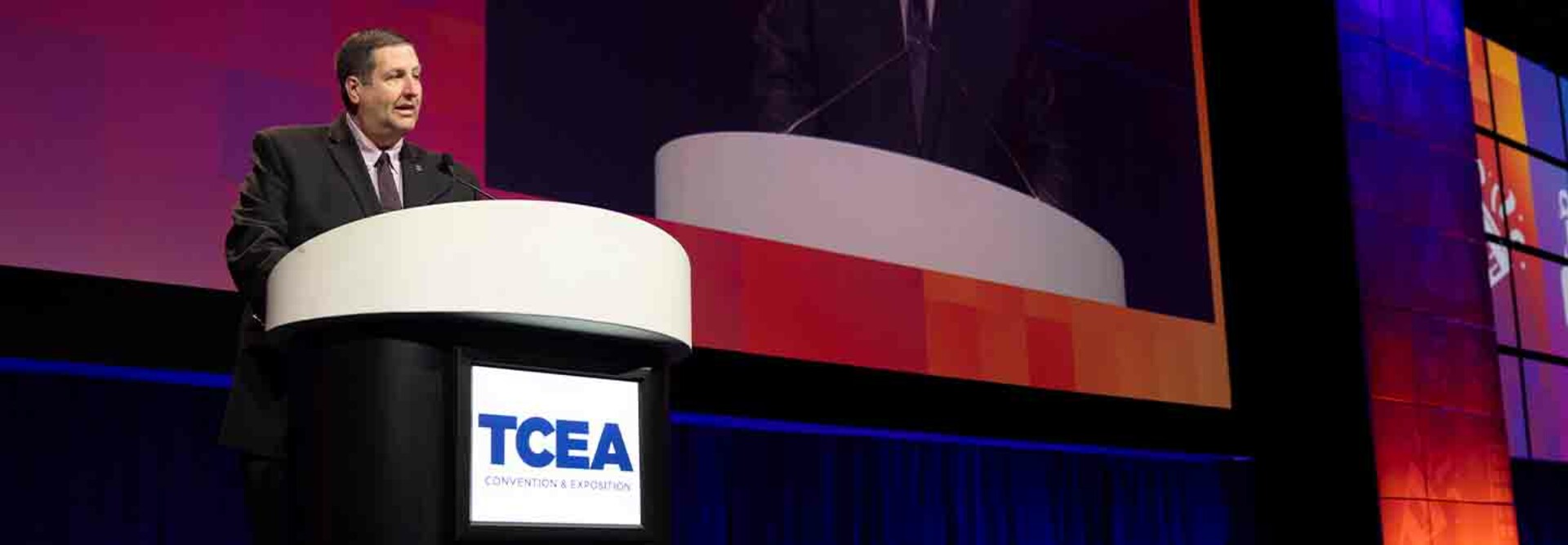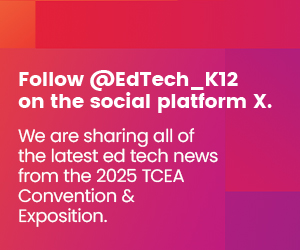While at the 2025 TCEA Convention & Exposition in Austin, Texas, EdTech: Focus On K–12 Managing Editor Taashi Rowe spoke with Brian Brown, the organization’s board president. Brown also serves as CTO for Duncanville Independent School District. While he previously served as executive director of data management and information officer at the College of Education at the University of Texas at Arlington, Brown spent seven years as a classroom teacher before moving into technology roles.
When he was named TCEA board president in 2024, Brown became responsible for guiding the agenda that supports its global membership of 85,000 educators, most of whom are focused on maximizing teaching and learning with technology in K–12. As the end of his one-year appointment approaches, Brown talked about artificial intelligence (AI), cybersecurity, funding and the future of education.
Click the banner below to stay up to date on innovative ed tech when you sign up as an Insider.
EDTECH: How are you ensuring that your students and teachers at Duncanville ISD are getting the most out of learning with technology?
BROWN: We are a 12,000-student school district. We’re about 85% free and reduced lunch, and we are one-to-one in pre-K through 12 and take-home in seventh through 12th grade.
To support all of those devices, you must have robust infrastructure with strong Wi-Fi, network switches and firewalls to handle and secure the traffic that is being generated by all of these devices.
But the teachers don’t really need to know about that stuff. They just need to know that it works. Building out that infrastructure is very mission-critical. My department has to make sure that technology is seamless.
DISCOVER: Learn more about two major federal privacy laws.
EDTECH: AI is a huge topic in education and elsewhere right now. How are you approaching it in your district and at the TCEA Level?
BROWN: AI is a good opportunity for us to exercise our mission at TCEA, which is to understand the impacts of technology, how we can maximize it and how our kids can benefit from it. Our district at Duncanville has put together a task force to figure out how we can best implement AI. I think it starts with high-quality professional development for teachers around the ins and outs of using a large language model in their classrooms.
We’re not actively blocking AI from our students, and a lot of that has to do with our demographic being 85% free and reduced lunch. If I am actively blocking some of the most modern technological tools available, our district is doing them a disservice. Our kids deserve to be able to go anywhere after graduation, and we don't want to be the roadblock. We want to enable their futures.
Blocking access to AI is a local decision. But from a philosophical standpoint, it’s perhaps not the best decision. There are multiple paths forward, and we need to find out what works the best and even talk about things that didn't work at all.
EDTECH: What are some of the biggest concerns for the IT portion of TCEA’s membership?
BROWN: When you get four or five tech directors sitting around a table, the main concern is cybersecurity. But student data privacy is a really big thing for us because we have become the de facto guardians of the district’s information systems.
It’s about protecting students’ data and employees’ data. TCEA has created a rubric for evaluating new technology solutions. We also support the Texas Data Privacy Agreement, which basically says any vendor that signs it is agreeing to treat our students’ data like we would treat our students’ data.
Vendors must build their products around data privacy. For us, this means making sure they have encryption embedded, have multifactor authentication, share what cybersecurity framework they are using and what their data governance model is. These are the conversations that we’re having with vendors now.
RELATED: Small schools call in backup for cybersecurity.
EDTECH: How else are you working with technology partners?
BROWN: We are not generally cybersecurity experts, and a cybersecurity analyst is not generally affordable for most school districts, so I have to partner with outside organizations to get that expertise. They can help us build out controls, governance structures and policy procedures, which are about how we handle the data we have.
35%
The percentage of K–12 district leaders surveyed who say they have artificial intelligence initiatives
Source: CoSN, CoSN 2024 State of EdTech District Leadership, April 2024
EDTECH: What is the next big challenge for K–12 schools?
BROWN: Technology has changed so much over the course of my 25-plus years in education. The form factors have gotten smaller and, generally speaking, we pay less per teacher and per student for technology today than we did 15 to 20 years ago.
However, there’s still an overhead to having all of that technology in those classrooms. And in the state of Texas, we haven't really had a change in our funding levels since 2019. So, while inflation continues to go up, our funding levels have remained static. The funding disparity needs to be addressed to at least deal with the inflation of the last six years.
And we also really need to start doing a better job of looking at our ROI. What is the number that says a particular investment was worth it? We are educators first, but that conversation is still necessary.
LEARN MORE: Teaching students how to use artificial intelligence sets them up for career success.
EDTECH: Looking toward the future, what are some of the big technology changes that will impact teachers and students?
BROWN: I think that we'll see continued movement in the AI area. There will be beneficial and problematic ways to use AI. Some of those concerns will be around using AI for misinformation, but that doesn't mean that we shouldn’t move forward. We’re just going to need to be cognizant.
I think we'll also see a continued conversation about screen time. My school district created some guidance for teachers to address that concern. Just because we are giving kids Chromebooks, that doesn’t mean they have to use them six hours a day. We’re seeing legislation introduced around students having cell phones in the educational environment. I think that those conversations are going to continue over the next few years.
Don’t miss a moment of TCEA event coverage. Keep this page bookmarked and follow @EdTech_K12 on the social platform X for live updates and behind-the-scenes content.














